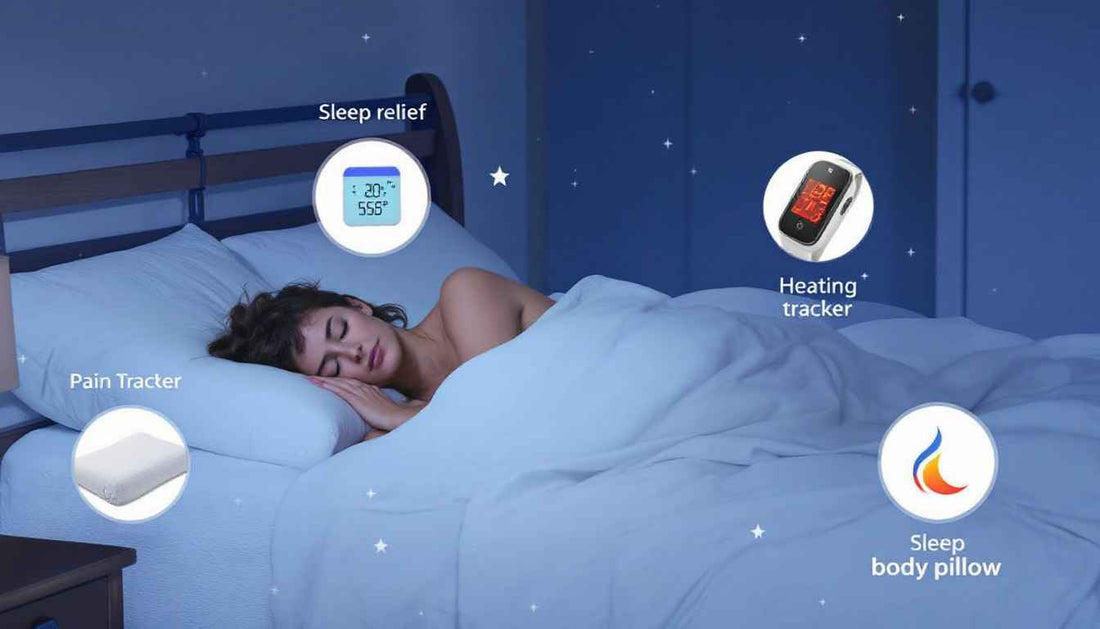
The Role of Sleep in Healing Chronic Pain: Why Rest Is Your Recovery Superpower
Share
Struggling with chronic pain that just won’t go away—no matter what you try? There’s one powerful, science-backed remedy that’s often overlooked: sleep. Research shows that poor sleep doesn’t just make pain feel worse—it can actually cause more pain by disrupting the body’s ability to heal. In this article, we’ll explore how sleep and pain are deeply connected, and how improving your rest can lead to real, long-term relief.
Sleep and Pain: The Science Behind the Connection
When you sleep, your body isn’t just resting—it’s working hard to repair muscles, regulate inflammation, and rebalance your nervous system. But when your sleep is poor or inconsistent, it triggers a chain reaction that heightens pain sensitivity and delays healing.
What Happens When You Don’t Sleep Well
- Increased Inflammation: Lack of sleep increases pro-inflammatory cytokines that worsen pain.
- Reduced Pain Threshold: Poor sleep makes your nerves more sensitive to pain signals.
- Mood Dysregulation: Anxiety and depression often rise with sleep deprivation, amplifying the perception of pain.
- Impaired Recovery: Your body repairs damaged tissues during deep sleep. Without enough of it, healing slows down dramatically.
Yes, sleep helps reduce pain by lowering inflammation, restoring tissue, and increasing your pain tolerance. Poor sleep increases both the intensity and duration of chronic pain.
How Much Sleep Do You Need for Pain Relief?
Most adults need 7–9 hours of quality sleep per night. But people with chronic pain often require even more rest to allow their bodies to recover.
- Deep Sleep (Stages 3 & 4): Vital for tissue repair and immune function
- REM Sleep: Supports emotional processing and pain perception regulation
If you’re waking up frequently or not entering deep sleep, your body doesn’t get a chance to heal properly—even if you’re technically “asleep.”
The Sleep-Pain Cycle: Breaking the Vicious Loop
How Pain Disrupts Sleep
Pain makes it harder to fall asleep and stay asleep. This leads to less restorative sleep—which then heightens pain the next day. Over time, this becomes a vicious cycle.
How Poor Sleep Exacerbates Pain
Studies show that just one night of poor sleep can significantly increase pain sensitivity. Chronic insomnia has been directly linked to long-term pain disorders like fibromyalgia and arthritis.
Pro Tip: Addressing sleep issues isn’t a luxury—it’s a foundational step in managing pain.
Natural Sleep Hacks for Chronic Pain Relief
1. Create a Pain-Friendly Sleep Routine
- Go to bed and wake up at the same time every day
- Avoid screens at least 60 minutes before bed
- Keep your bedroom dark, cool, and quiet
2. Use Mind-Body Techniques Before Bed
- Meditation: Helps calm the nervous system
- Breathing Exercises: Reduce tension and help you fall asleep faster
- Progressive Muscle Relaxation: Eases pain and stress
3. Upgrade Your Sleep Environment
- Use an orthopedic or memory foam mattress
- Try body pillows for joint support
- Consider weighted blankets to reduce anxiety
4. Supplement Smartly
- Magnesium: Supports muscle relaxation and sleep quality
- Melatonin: Helps regulate sleep-wake cycles
- CBD: May reduce both pain and insomnia (consult your healthcare provider)
5. Time Your Pain Medications Strategically
Talk to your doctor about timing your medication so it kicks in when you lie down, not after you’ve already tossed and turned for hours.
Best Wearable Tools and Tech for Sleep & Pain Recovery
At Recovyx, we believe tech can play a vital role in improving sleep and reducing pain. Here are our top picks:
- Smart Heated Wraps: Promote muscle relaxation before sleep
- Wearable TENS Units: Diminish pain signals during the night
- Sleep-Tracking Smartwatches: Identify patterns that could be sabotaging your sleep
Explore our top-rated recovery tools for more options.
Internal Links
- Discover how Meditation Can Reduce Pain
- Learn Breathing Techniques to Melt Away Tension
- Explore the Top Wearable Devices for Pain-Free Living in 2025
FAQ – People Also Ask
Q: Can poor sleep really make pain worse?
A: Yes. Lack of sleep increases pain sensitivity and inflammation, making chronic pain conditions harder to manage.
Q: What’s the best sleeping position for chronic pain?
A: Side-sleeping with a pillow between your knees or on your back with knee support can reduce joint pressure.
Q: How can I fall asleep if I’m in pain?
A: Try a warm bath, breathing exercises, or applying heat therapy 30 minutes before bed.
Q: Does melatonin help with pain?
A: Melatonin can help regulate your sleep cycle and may also reduce pain perception. Speak to your doctor before use.
Final Thoughts: Sleep Is Your Secret Weapon for Healing
The road to pain relief doesn’t just run through pills or physical therapy—it runs through your bedroom. Prioritizing high-quality sleep can transform how your body manages pain, boosts recovery, and enhances your quality of life.
CTA:
💤 Want pain-free, restful nights? Discover our advanced sleep & pain recovery tools at Recovyx.com and start waking up without pain.
